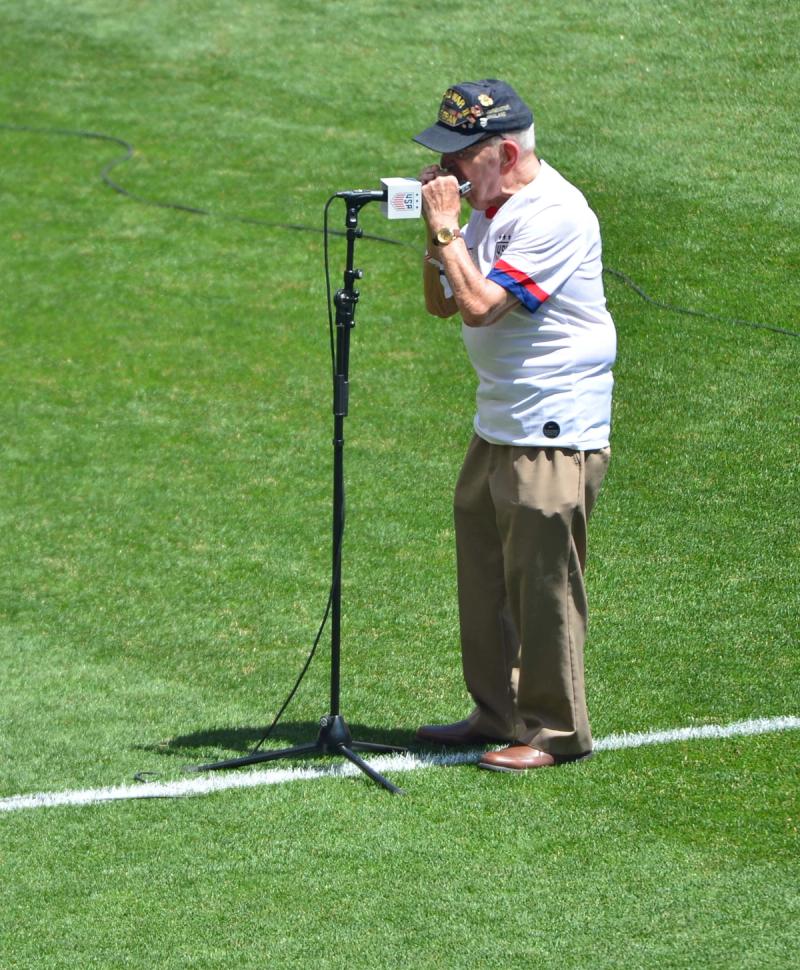DuPre, who lives in the Rochester, N.Y. suburb of Fairport, and his generation did not have it easy during his early years, growing up during the Great Depression when jobs and money were scarce.
He was introduced to the harmonica as more of a necessity than a love for it or music. After his family moved to a Pittsburgh suburb in 1933, DuPre attended a school that had a harmonica band.
"A harmonica band sounds kind of weird but during the depression and I am talking about the middle of the depression, schools could not afford tubas, trumpets, sax, drums, but they could afford harmonicas. To take care of a bunch of kids, they bought little Marine Band Harmonicas."
Since DuPre didn't know anyone in his new neighborhood, he figured that if he could join that band so he could make friends. He said his father "saved a penny here and a penny there," enough to buy a harmonica during some rough economic times.
DuPre discovered one room in the house which "was absolutely perfect to learn" his new-found instrument – the bathroom.
"We were not musical and there was no music in the family, but I had my harmonica and I wanted to learn to play," he said. "The room had tiled walls, tiled floor, a bathtub, sink, and the resonance there was perfect, absolutely perfect, like having your own sound chamber. I used to sit on that one chair in the middle of the room and learned how a particular note was. God gave me enough back here [pointing to the back of his head] to hold onto that sound.
"After a while it just kind of blended in. I'm not a musician. I never had a music lesson in my life."
As DuPre discovered, life can have its own lessons, some bitter ones. By the time he was 20-years-old he and his four siblings had lost both their mother and father, who passed away. He became the acting patriarch of the family, trying to hold it together.
"My mother died at 44 with five kids," he said. "My dad remarried because all of a sudden he had five kids. He was on the road. He was a tobacco man. We didn't have parental guidance at all. My dad died two years after my mother. So, we were suddenly five orphaned kids. I was the oldest boy and I was 20. Thank God for the neighbors and relatives that we had. Nobody got into any great trouble or anything."
There were, however, far greater forces at work. World War II broke out and DuPre found himself with the U.S. Army across the Atlantic Ocean. As it turned out, DuPre followed a family tradition by working on the medical side. In World War I, his mother was a nurse in the Royal Canadian Air Force and his father was a medic and foot solider.
"So, we had that medical background," he said. "When it came time to get [into the service], I tried to get into medics because I had such extensive training and practice. When you took care of these guys when they came back, you learned an awful lot of hands-on medicine."
DuPre was stationed in the 114th General Hospital Unit in Kidderminster, England.
"It was busy, it was tremendously busy," he said. "They knew they were going to have great numbers of wounded who were dying.
"So, we were highly trained medics. Our job, a guy gets injured in the battle of the bulge, for example, and he's lying there in the snow and bleeding. A medic comes along, stops the bleeding, sets the broken bones to the extent that you'd be able to move this man, and then they would fly him across the channel to us. Our job was to put them back together again. That usually leads to 'Wow, you must have seen some stuff' and we did."
He served three years there.
